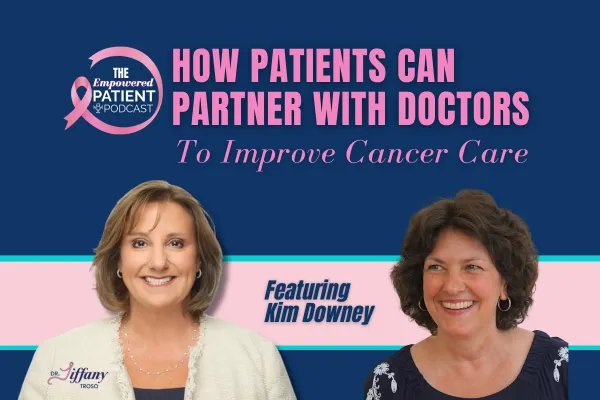
How Patients Can Partner With Doctors To Improve Cancer Care
Are the people taking care of you running on empty? Physicians are under incredible pressure, and when they face burnout or moral injury, it’s patients who feel the impact.
In this episode, Dr. Tiffany sits down with Kim Downey, a three-time cancer survivor and tireless advocate for physician wellness, to show how supporting doctors can directly improve your care. You’ll hear real stories of what works, what doesn’t, and how building connection and communication in healthcare changes everything. Tune in to discover practical ways to empower yourself as a cancer patient while helping the people caring for you thrive.
What You’ll Learn:
Why supporting physician wellness directly impacts the quality of your care.
How one patient connected thousands of doctors to create real change.
The one conversation that changed how Kim approaches patient and doctor relationships.
Why gratitude notes to doctors can transform their ability to care for you.
How miscommunication in medicine causes unnecessary stress for patients and doctors.
A relatable story of a doctor going the extra mile after a tough diagnosis.
What motivational interviewing teaches doctors about truly listening to patients’ needs.
Key Moments
00:45 Kim’s Journey Through Three Cancer Diagnoses
04:13 The Moment Kim Learned About Her Doctor's Death
08:08 How Patients Can Guide Their Loved Ones To Receive Real Support
10:34 Ways Physician Wellbeing Directly Impacts Cancer Care
15:17 The Power Of Thank You Notes And Recognizing Doctors Efforts
20:47 Doctors Who Go The Extra Mile And How It Affects Patient Experience
26:48 How Collaborative Care Between Specialists Can Improve Patient Outcomes
Facing Health Challenges Can Lead To Purpose
Experiencing serious health challenges, like multiple cancer diagnoses, can feel overwhelming, but it can also reveal a deeper calling. Many patients find that their struggles give them a unique perspective on the healthcare system and inspire ways to support both patients and providers. Reflecting on your own experience and identifying the areas where you want to make a difference can help you channel your energy into meaningful action. This could be as simple as advocating for better communication or creating resources that support patient care and provider wellbeing.
Understanding The Emotional Weight Of Medical Loss
Losing a trusted doctor or healthcare professional can be deeply destabilizing, especially during your own medical journey. It highlights how fragile the support system can be, and how much we rely on strong, caring providers. According to Kim Downey, recognizing this reality can help patients prepare emotionally for gaps in care and prioritize building a network of supportive professionals and community members around them. Acknowledging your feelings and seeking ways to process them is essential for moving forward.
Guiding Your Loved Ones On How To Help
Patients often find that well-meaning family and friends don’t know how to offer meaningful support. Providing specific guidance, like helping with meals on treatment days or accompanying you to appointments, can reduce stress and make care more effective. This approach benefits both you and those who care about you, giving them a clear way to contribute while allowing you to focus on recovery. Clear communication about your needs creates a smoother support system and reduces frustration for everyone involved.
Supporting Physician Wellbeing Improves Patient Care
Physicians who are burnt out or emotionally exhausted cannot provide their best care. By understanding the connection between provider wellbeing and patient outcomes, cancer patients can appreciate the importance of advocating for systemic changes that support doctors. Encouraging physicians to take time for self-care, continuing education, and professional development ultimately benefits everyone. Patients and caregivers who recognize this can contribute by supporting initiatives and programs that focus on wellness for medical professionals.
Small Acts Of Gratitude Make A Big Difference
A simple thank you note or acknowledgment of a physician’s efforts can have a meaningful impact on morale. These gestures remind doctors that their work is noticed and appreciated, helping to foster a more positive environment in healthcare settings. Patients who take the time to express gratitude often find that it strengthens their relationship with their providers and encourages more attentive, compassionate care.
Collaboration Between Providers Enhances Care
Referrals and collaborative care among specialists can improve patient outcomes significantly. Kim explains that patients benefit when providers communicate openly, share insights, and work as a team. Understanding the value of these connections allows patients to advocate for comprehensive care and ensures that no detail is overlooked. Being proactive about collaborating with your care team can prevent miscommunications and gaps in treatment.
Taking Ownership Of Your Care Experience
Ultimately, you are in the driver’s seat of your own healthcare journey. Kim believes the best place to start is learning to advocate for yourself, asking questions, and seeking second opinions when necessary. Building a network of supportive providers, utilizing resources like dieticians or specialists, and clearly communicating your needs ensures that you feel heard, supported, and empowered throughout your treatment and recovery.



